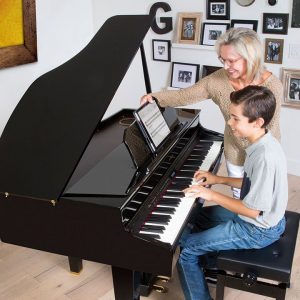
Best Apps For Learning Piano
You might have heard the saying: there’s an app for that. When it comes to apps for learning the piano, the options can feel endless.
Every parent wants the best for their child and it’s challenging to find positive activities that they will enjoy. Most adults who began piano at a young age consider it to be one of the most positive learning experiences they have had.
Piano is aligned with improved memory, mathematics, social, creative, reading and comprehension skills. Simply put, playing piano encourages your child to use their brain, their physical coordination and their creativity.
Above all, playing the piano opens your child to the enjoyment of learning a new skill and the rewards of being disciplined. This in turn helps with both schoolwork and sports. It also develops an appreciation of music and will add a richness to your child’s life.

There is no clear-cut rule for how old your child should be before beginning piano lessons. That said, it is true that the starting age has been coming down. This is not just for piano lessons, but for many other learning activities. The key is to determine how well these learning activities match up with your child’s physical and brain development.
Many children begin taking piano lessons at kindergarten age and some begin even earlier! Faculties that develop by leaps and bounds when a child is still very young include hearing, memory, judgment, and thinking ability.

The use of smartphones and iPads has skyrocketing during the last decade. With that, apps for learning to play musical instruments are becoming more and more common. As someone who learned piano as an older child, I would have given anything to have access to the sorts of apps children have available today.
That being said, while apps can make learning to play the piano seem easy, one app doesn’t necessarily fit all. It’s important to understand what sort of piano player your child is before selecting the app that’s right for them.

Learning piano isn’t all about learning the notes and keys. It’s also a sensory experience. This is why it’s important to give children the freedom to explore the instrument freely on a regular basis.
For younger children, ask them to name their favourite story and then let them come up with an improvised song that tells this story. Alternatively, you can get them to create a happy song, a sad song, an exciting song, a scary song – the choice is almost limitless.
With older children, you can ask them to create a song on the white or black notes only, or even in a specific key like C major. Other children will simply enjoy the pleasure of having free time to experiment.

When I was growing up, I was lucky. My mother asked the same question that you’re asking. My mother played the piano and loved music. But she knew that she had to find someone else to teach me. “It’s hard to teach your child anything, especially if that child is a daughter!” she’d quip.
So, my mum looked around. Like you, she wanted to find the right teacher. And she did. When I was eight, I began piano lessons. Every Tuesday afternoon after school, I’d arrive at my teacher’s house. Her black Labrador would greet me with friendly licks and a wagging tail. My teacher was very kind. She’d offer me little pieces to learn. One was called, “Pony Trot,” and there was “Short Story” and “Novelette,” by a Russian composer named Dmitry Kabalevsky. These were beautiful little pieces, and I remember them to this day.


You might have heard the saying: there’s an app for that. When it comes to apps for learning the piano, the options can feel endless.

Dear Parent, as I began to think about what I’d share with you, I decided to write a letter. A letter to you, a parent

Every parent wants the best for their child and it’s challenging to find positive activities that they will enjoy. As a kid, learning piano at a young
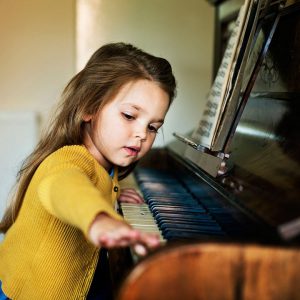
Many parents think piano lessons are the start of their child’s musical journey. This article will provide you with some useful tips on activities you can do before
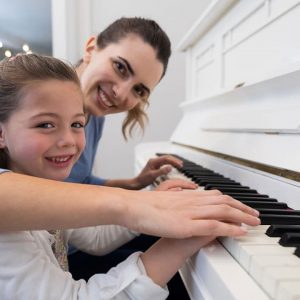
As a parent, it is sometimes difficult to guide your children towards positive activities that will help them navigate life and to become better people.

In this article, we speak with Yumi Sasada on the practicalities of home practicing and parent involvement. What are the advantages of regular practice and

Recently, we asked Yumi Sasada the question, ‘ What age can a child start piano lessons? ‘. As an experienced trainer of piano teachers and the owner

Contributed by Roland UK Team Choosing between a digital and an acoustic piano can be confusing. The acoustic piano has changed very little from the

Piano lessons for kids can really accelerate their learning. This is important because children can get so much from learning to play an instrument well.
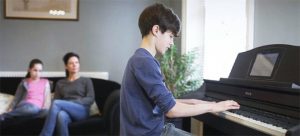
The piano has the ability to excite, move and inspire; whether you’re playing Chopin’s Scherzos or the intro to Clocks by Coldplay. The only obstacles

Buying a new piano can be a bit tricky if you don’t know what to look for! The only way to truly find your perfect
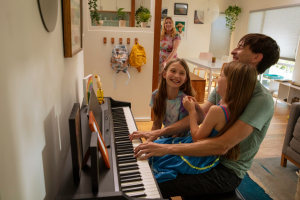
Navigating your child’s first piano purchase is thrilling yet challenging for parents without musical expertise. In this guide, we tackle vital concerns, from the necessity